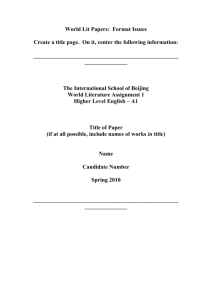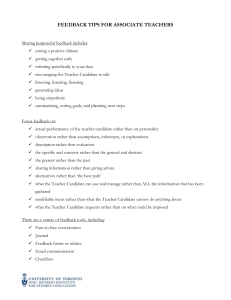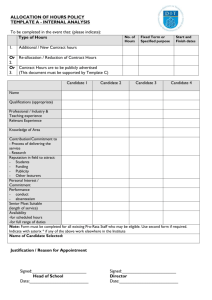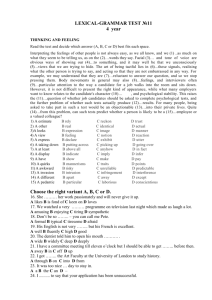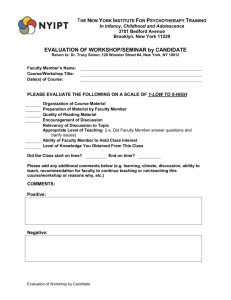EDUC 701 Syllabus Course Syllabus EDUC 701 Theories and
advertisement
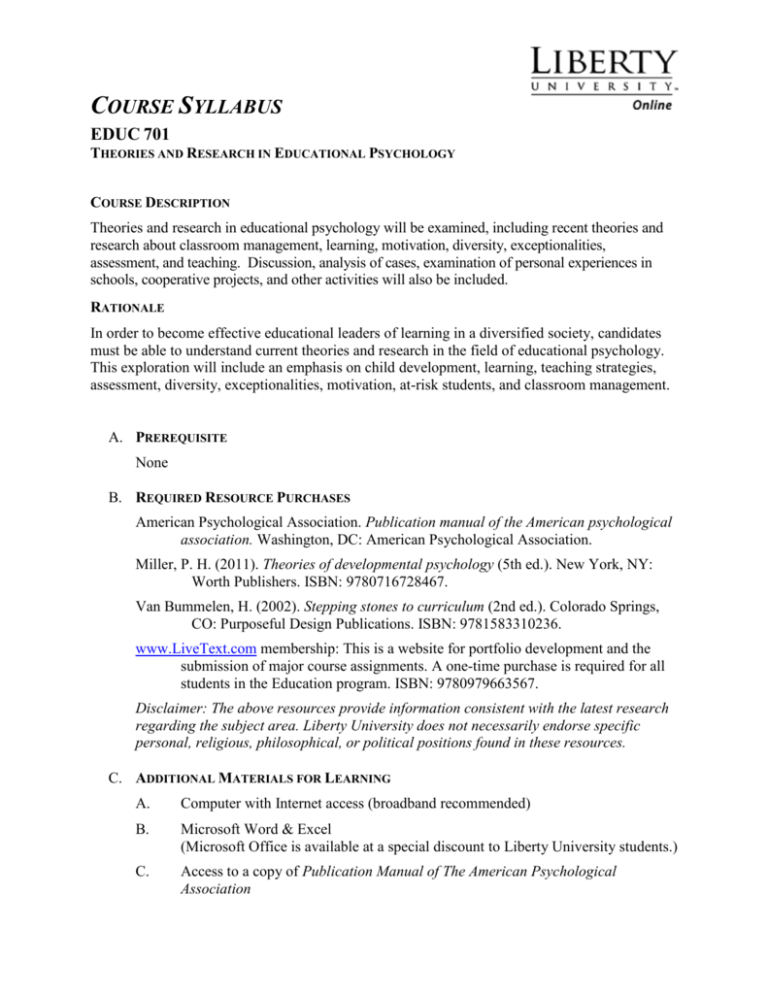
COURSE SYLLABUS EDUC 701 THEORIES AND RESEARCH IN EDUCATIONAL PSYCHOLOGY COURSE DESCRIPTION Theories and research in educational psychology will be examined, including recent theories and research about classroom management, learning, motivation, diversity, exceptionalities, assessment, and teaching. Discussion, analysis of cases, examination of personal experiences in schools, cooperative projects, and other activities will also be included. RATIONALE In order to become effective educational leaders of learning in a diversified society, candidates must be able to understand current theories and research in the field of educational psychology. This exploration will include an emphasis on child development, learning, teaching strategies, assessment, diversity, exceptionalities, motivation, at-risk students, and classroom management. A. PREREQUISITE None B. REQUIRED RESOURCE PURCHASES American Psychological Association. Publication manual of the American psychological association. Washington, DC: American Psychological Association. Miller, P. H. (2011). Theories of developmental psychology (5th ed.). New York, NY: Worth Publishers. ISBN: 9780716728467. Van Bummelen, H. (2002). Stepping stones to curriculum (2nd ed.). Colorado Springs, CO: Purposeful Design Publications. ISBN: 9781583310236. www.LiveText.com membership: This is a website for portfolio development and the submission of major course assignments. A one-time purchase is required for all students in the Education program. ISBN: 9780979663567. Disclaimer: The above resources provide information consistent with the latest research regarding the subject area. Liberty University does not necessarily endorse specific personal, religious, philosophical, or political positions found in these resources. C. ADDITIONAL MATERIALS FOR LEARNING A. Computer with Internet access (broadband recommended) B. Microsoft Word & Excel (Microsoft Office is available at a special discount to Liberty University students.) C. Access to a copy of Publication Manual of The American Psychological Association EDUC 701 Syllabus D. MEASURABLE LEARNING OUTCOMES Upon successful completion of this course, the candidate will be able to: A. Apply principles of effective instruction to improve instructional practices and curricular materials through class discussion, application of readings, and the analysis of journal literature in educational psychology. B. Use appropriate research strategies to promote an environment for improved student achievement by conducting an analysis of the affordances for and hindrances to student learning and motivation in a school. C. Design learning environments that fit students' developmental levels and capitalize on student diversity to improve learning that reflect this understanding and appreciation. D. Promote the best practices for student learning through the knowledge of theory and research on learning, cognition, and memory, including information processing, cognitive, and constructivist perspectives. E. Apply knowledge, dispositions, and performances necessary for assessing learning environments and implementing context-appropriate strategies. F. Apply a biblical worldview to the analysis of the literature reviews, readings and research in educational psychology. G. Design a theoretical framework supporting an approved research question. E. COURSE REQUIREMENTS AND ASSIGNMENTS A. Textbook readings, journal article readings, and lecture notes B. Course Requirements Checklist As the first activity in this course, please read the syllabus and Student Expectations. After reading the syllabus and Student Expectations, the student will then complete the related checklist found in Module/Week 1. C. Discussion Board forums (5) The candidate will participate in five graded Discussion Board forums throughout the course. Each forum will consist of two parts: 1) an original thread in response to the prompt and 2) at least two reply posts in response to their classmates’ original threads. All threads should be at least 400 words and should be posted by the end of Thursday of the pertinent week. Replies should be at least 200 words and should be posted by the end of the last day of the pertinent week. Both the frequency with which a candidate participates and the depth of the content written will affect the candidate’s grade. D. Class Introductions The candidate will participate in an introductions discussion forum. The introduction thread should include a picture of the candidate alone and general biographical information about the candidate. The assignment is due by the end of Module/Week 1. Page 2 of 5 EDUC 701 Syllabus E. Analysis of Theoretical Framework The candidate will read an assigned faculty member’s published dissertation and write an analysis of the theoretical framework used in the dissertation. This paper will be 2–3 pages in length and should reflect APA style. This assignment is due by the end of Module/Week 2. F. Research Question The candidate will develop a quality research question related to a specific learning theory upon which he/she can build a Theoretical Framework Paper. The instructor will evaluate and comment on the candidate’s submitted question in order to help ensure quality and usability. This assignment is due by the end of Module/Week 3. G. Theory in Action Lesson Plans (3) The candidate will apply some of the learning theories covered in the Miller textbook by developing Lesson Plans based on a chosen theory. These Theory in Action Lesson Plans will be submitted by the ends of Module/Weeks 3, 5, and 7. H. Article Critiques (2) The candidate will find scholarly, empirical journal articles that have been written within the last five years. The article should clearly relate to the learning theory and research question that will be used for the Theoretical Framework Paper. Then, the candidate will compose a 1–2-page critique of the chosen articles. The article critiques will be submitted by the ends of Modules/Weeks 4 and 5. I. Theoretical Framework Bibliography The candidate will create an APA-formatted bibliography that includes at least 10 empirical, scholarly, current sources. This bibliography will be the research foundation for the Theoretical Framework Paper. The bibliography is due by the end of Module/Week 6. J. Theoretical Framework Outline Using a provided outline template, the candidate will create a detailed outline for the Theoretical Framework Paper. This assignment is due by the end of Module/Week 6. K. Adult Learning Theory Quiz In Module/Week 7, the candidate will be required to review an article that addresses adult learning theories, and then complete an open-notes quiz covering the material. The quiz consists of 10 multiple-choice questions and will have a 1hour time limit. Page 3 of 5 EDUC 701 Syllabus L. Theoretical Framework Paper The candidate will write an 8–10-page, APA-formatted paper building upon the research question, bibliography, and outline that are submitted throughout the course. The paper should include a minimum of 10 scholarly, empirical, current sources. The paper should synthesize all of the research into a well-blended paper and should clearly address the research question using the chosen learning theory. The paper is due in LiveText by the end of Module/Week 8. VI. COURSE GRADING AND POLICIES A. B. C. Points Course Requirements Checklist 10 Discussion Board forums (5 at 50 pts ea) 250 Class Introductions 50 Analysis of Theoretical Framework 80 Research Question 20 Theory in Action Lesson Plans (3 at 80 pts ea) 240 Article Critiques (2 at 80 pts ea) 160 Theoretical Framework Bibliography 50 Theoretical Framework Outline 50 Adult Learning Theory Quiz 20 Theoretical Framework Paper 80 Total 1010 Scale A = 960–1010 A- = 940–959 B+ = 920–939 B = 890–919 B- = 870–889 C+ = 850–869 C = 820–849 C- = 800–819 D+ = 780–799 D = 750–779 D- = 730–749 F = 729 and below Late Assignment Policy The nature of this course requires that the candidate interact with the material, professor and other students on a weekly basis. Because of this, it is difficult to achieve the fullest experience in this learning environment when assignments are late. If unable to complete an assignment on time, the candidate must contact the instructor immediately by email to make arrangements for the completion of that assignment. Assignments that are submitted after the due date without appropriate excuse and pre-approval will receive the following deductions: Assignments submitted after the due date will receive a 10% deduction. Assignments submitted more than one week late receives a 20% deduction. Assignments submitted after two weeks late or after the final due date of the class will not be accepted without documentation or extenuating circumstances. Page 4 of 5 EDUC 701 Syllabus D. Disability Assistance Students with a documented disability may contact Liberty University Online’s Office of Disability Academic Support (ODAS) at LUOODAS@liberty.edu to make arrangements for academic accommodations. Further information can be found at www.liberty.edu/disabilitysupport. Page 5 of 5
